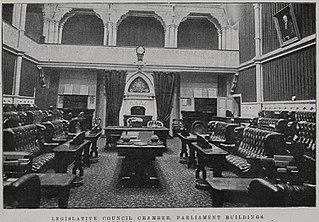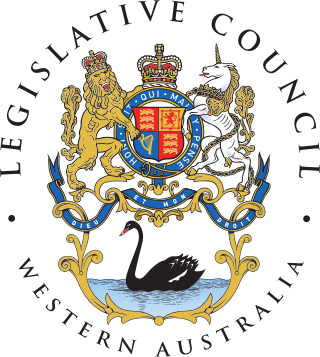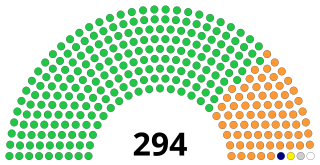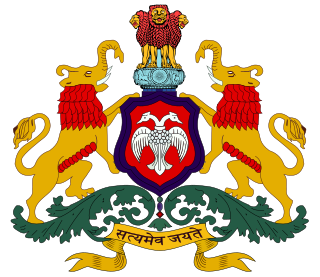Related Research Articles

In modern politics, and history, a parliament is a legislative body of government. Generally, a modern parliament has three functions: representing the electorate, making laws, and overseeing the government via hearings and inquiries. The term is similar to the idea of a senate, synod or congress and is commonly used in countries that are current or former monarchies. Some contexts restrict the use of the word parliament to parliamentary systems, although it is also used to describe the legislature in some presidential systems, even where it is not in the official name.
Unicameralism is a type of legislature, which consists of one house or assembly, that legislates and votes as one. Unicameralism has become an increasingly common type of legislature, making up nearly 60% of all national legislatures and an even greater share of subnational legislatures.
Legislative assembly is the name given in some countries to either a legislature, or to one of its houses.

The Legislative Council of the Hong Kong Special Administrative Region (LegCo) is the unicameral legislature of Hong Kong. It sits under China's "one country, two systems" constitutional arrangement, and is the power centre of Hong Kong's hybrid representative democracy, though popular representation in the legislature has diminished significantly in recent years, along with its political diversity.
A legislative council is the legislature, or one of the legislative chambers, of a nation, colony, or subnational division such as a province or state. It was commonly used to label unicameral or upper house legislative bodies in the British (former) colonies. However, it has also been used as designation in other (non-Commonwealth) nations. A member of a legislative council is commonly referred to as an MLC.

The New South Wales Legislative Council, often referred to as the upper house, is one of the two chambers of the parliament of the Australian state of New South Wales. The other is the Legislative Assembly. Both sit at Parliament House in the state capital, Sydney. It is normal for legislation to be first deliberated on and passed by the Legislative Assembly before being considered by the Legislative Council, which acts in the main as a house of review.

The Victorian Legislative Council (VLC) is the upper house of the bicameral Parliament of Victoria, Australia, the lower house being the Legislative Assembly. Both houses sit at Parliament House in Spring Street, Melbourne. The Legislative Council serves as a house of review, in a similar fashion to its federal counterpart, the Australian Senate. Although, it is possible for legislation to be first introduced in the Council, most bills receive their first hearing in the Legislative Assembly.

The New Zealand Legislative Council was the upper house of the General Assembly of New Zealand between 1853 and 1951. An earlier arrangement of legislative councils for the colony and provinces existed from 1841 when New Zealand became a colony; it was reconstituted as the upper house of a bicameral legislature when New Zealand became self-governing in 1852, which came into effect in the following year.

The Parliament of New South Wales is a bicameral legislature in the Australian state of New South Wales (NSW), consisting of the New South Wales Legislative Assembly and the New South Wales Legislative Council. Each house is directly elected by the people of New South Wales at elections held approximately every four years. The Parliament derives its authority from the King of Australia, King Charles III, represented by the Governor of New South Wales, who chairs the Executive Council. The parliament shares law making powers with the Australian Federal Parliament. The New South Wales Parliament follows Westminster parliamentary traditions of dress, Green–Red chamber colours and protocols.
The State Legislative Assembly, or Vidhan Sabha, also called Saasana Sabha, is a legislative body in each of the states and certain union territories of India. In 22 states and 3 union territories, there is a unicameral legislature which is the sole legislative body. In 7 states, the legislative assembly is the lower house of their bicameral legislature with the upper house being the State Legislative Council. 5 union territories are governed directly by the Union Government of India and have no legislative body.

A Member of the Legislative Assembly (MLA) is a representative elected by the voters of an electoral district (constituency) to the legislature of State government in the Indian system of government. From each constituency, the people elect one representative who then becomes a member of the Legislative Assembly (MLA). Each state has between seven and nine MLAs for every Member of Parliament (MP) that it has in the Lok Sabha, the lower house of India's bicameral parliament. There are also members in three unicameral legislatures in Union Territories: the Delhi Legislative Assembly, Jammu and Kashmir Legislative Assembly and the Puducherry Legislative Assembly. Only a Member of the Legislative Assembly can work as a minister for more than 6 months. If a non-Member of the Legislative Assembly becomes a Chief Minister or a minister, he must become an MLA within 6 months to continue in the job. Only a Member of the Legislative Assembly can become the Speaker of the Legislature.

The Western Australian Legislative Council is the upper house of the Parliament of Western Australia, a state of Australia. It is regarded as a house of review for legislation passed by the Legislative Assembly, the lower house. The two Houses of Parliament sit in Parliament House in the state capital, Perth.
The State Legislative Council, or Vidhan Parishad, or Saasana Mandali is the upper house in those states of India that have a bicameral state legislature; the lower house being the State Legislative Assembly. Its establishment is defined in Article 169 of the Constitution of India.

The West Bengal Legislative Assembly is the unicameral legislature of the Indian state of West Bengal. It is located in the B. B. D. Bagh area of Kolkata, the capital of the state. Members of the Legislative assembly are directly elected by the people. The legislative assembly comprises 294 Members of Legislative Assembly, all directly elected from single-seat constituencies. Its term is five years, unless sooner dissolved.

The Andhra Pradesh Legislative Assembly or Āndhra Pradēś Śāsana Sabha is the lower house of the bicameral legislature of the Indian state, Andhra Pradesh.

The Tamil Nadu Legislative Assembly is the unicameral legislature of the Indian state of Tamil Nadu. It has a strength of 234 members, all of whom are democratically elected using the first-past-the-post system. The presiding officer of the Assembly is the Speaker. The term of the Assembly is five years, unless dissolved earlier.
State governments in India are the governments ruling over 28 states and 8 union territories of India and the head of the Council of Ministers in a state is the Chief Minister. Power is divided between the Union government and state governments. While the Union government handles defence, external affairs etc., the state government deals with internal security and other state issues. Income for the Union government is from customs duty, excise tax, income tax etc., while state government income comes from sales tax (VAT), stamp duty etc.; now these have been subsumed under the various components of the Goods and Services Tax

The Karnataka Legislative Council is the upper house of the state legislature of Karnataka. Karnataka is one of six Indian states with a bicameral legislature; the Legislative Assembly is the lower house. The Council is a permanent body of 75 members, of whom 64 are elected in various ways in staggered elections and 11 are appointed by the Governor of Karnataka. Members hold their seats for six-year terms.

The Delhi Legislative Assembly, also known as the Delhi Vidhan Sabha, is a unicameral legislature of the union territory of Delhi in India. Delhi Legislative Assembly is the legislative arm of the Government of Delhi. At present, it consists of 70 members, directly elected from 70 constituencies. The tenure of the Legislative Assembly is five years unless dissolved sooner.
References
- ↑ Munasinghe, Sarath K. "Political clergymen of the past". Island. Retrieved 8 May 2020.